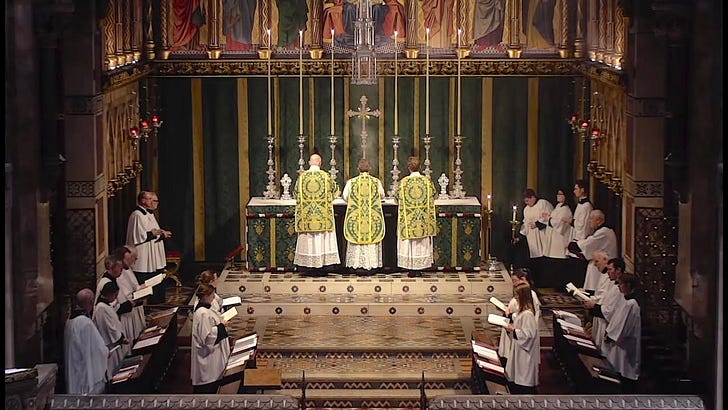In England in the 1980s, we used to see a famous face on the news almost every day, or so it seemed to me in my childhood. Bearded, aviator glasses. He seemed to be some kind of ventriloquist. His lips were always out of sync with what was being said. So I asked my parents and found out that it wasn’t his voice, it was a voiceover. It’s not that he was speaking a foreign language. It’s just that his voice was not allowed to be broadcast on British TV. The broadcasters worked around this by filming him - Gerry Adams, that is - and getting someone else to do the talking.
You couldn’t hear his voice, but the voice of the Government ban was clear. We do not listen to terrorists. We do not honour with the gloss of televisual respectability their methods or their motives. No complicity, no compromise.
And this is not so far, I think, from the import of Our Lord’s trials with the Devil in the wilderness. He is offered a compromise which could end the ancient war of spirits. And He refuses.
It is that moment popularised ever since in so many great stories. It’s the Miltonian moment when pride whispers, “you could a better job:” think what you could achieve as Prince of Demons instead of staying a mere servant among the heavenly host! Or the moment when any one of the Fellowship of the Ring could seize the ancient weapon from Frodo and enforce a peace after their own image. Or the moment when Luke Skywalker refuses his father’s hand, and the offer to co-rule the Empire in a new era of stability and order, if he will only embrace the dark side of the Force.
The heroic act in each case is to refuse to compromise with evil. And yet we see, over and again, the warning go unheeded, and the fallen human propensity to shoddy attempts at appeasement.
Dare I say, we see it even in the Church. Consider the first temptation. Our Lord in the wilderness might have taken the Devil’s suggestion and magicked up enough food from rocks to feed the world, as though that would solve all our problems. But He didn’t. He refused. He pointed instead to the supernatural bread which proceeds from the mouth of God. To the Word of God. That is, to Himself.
And yet, there are movements in the Church which, wavering from faith in that supernatural bread, take it on themselves instead to do what Our Lord refused to do, and devote their energy to turning stones into bread. To address the “material causes of sin,” as the Liberation theologians put it, even though Our Lord teaches that the root of all sin is not how much you can put into your mouth, but what comes out of it from the heart. Or, to put our trust in opaquely audited payments of “reparation” for the atonement of presumptive and indemonstrable historic guilt, rather than in the Cross for atonement of our real, obvious and ever-present sin. Or, to neglect evangelisation, catechism, and the teaching of sound doctrine in favour of “social justice initiatives” which happen to coincide with the political whim of the clergy. Christians seem to forget that we have a better bread to offer, the angelic bread that endures to eternal life.
Then there are those in the church who like to stand with the Devil on the mountaintop, and fancy ourselves lords of all we survey. The Church is easily compromised by the seductive offers of state and high society. Just bend the knee on this small point of doctrine, say the mighty of the land, just a slight modification in the interest of kindness, you understand, and we will let you have access to the highest of places: you can have your seats in the Lords, oversight over schools, chaplaincies in national institutions, access to the military, seats at college high tables, the right to preach to kings, or presidents. By gentleman’s agreement, we can brush certain historic indiscretions under the carpet, for the sake of the common good. You can stay part of the club. Just don’t listen to the prophets of doom with their slippery slopes.
But soon enough you see that the slippery slope is not only real, but more like a precipice, and that the Devil’s got your back.
We are left with one more temptation: in St Matthew’s account, the second; in St Luke’s the third and last. This too is one to which the modern church is susceptible: jumping off the Temple roof in the hope that angels will catch us. It’s the error of complacency, or “cheap grace.”
“What must I do to inherit eternal life?,” a young man once asked the Lord. “Nothing” was not the answer. “Just let it all go, let God do all the work; jump and let the angels catch you:” this He did not say. If you want to be lifted up to the heavens, if you want to ascend with Our Lord into union with the Father, if you want to be “perfect,” that is, not just saved but divinised, then there is work to be done.
Evangelical friends, fret ye not. I am not suggesting salvation by works. Salvation comes at the gift of God and is received in the regenerative lather of baptism. The answer to the question of the door-knocking evangelist, “have you been saved?” is “yes: in my baptism.” Therein our soiled and fallen image is restored to the image of God. Granted.
But we are made not only in God’s image. We are made in His likeness, too, and to grow more like Him, like Christ, requires ascetic effort: cooperation with the grace of God. The distinction between salvation and sanctification, between restoration of the image and growth in the likeness of God, is what makes our Lenten rigours worthwhile.
To become “perfect,” Our Lord counselled the young man, for him meant giving up all his considerable wealth. For you or me, it might mean something different. But whatever it is, it demands sacrifice. Sacrifice, that is, of all reliance on anything except God. It means renouncing anything that is ungodly, anything that directs our love away from God towards worldly things. It means crucifixion of the will, without complacency or compromise.
So, this Lent, Our Lord urges us: listen to God alone. Do not negotiate with the Devil.
First, take your fast seriously. We who compromise on bodily appetites will also compromise in the spirit. We must train ourselves to rely more deeply on the bread of life, in Word, Sacrament and service.
Second, refuse compromise with the powers of the world, especially with money. We need to alms generously and cut spending on ourselves; to reconsider how we allocate our resources of time and act accordingly.
Thirdly, pray. Place your trust entirely in God, not by negligence or complacency, but by entering into the Opus Dei, the godly work of prayer, starting with the praying of the daily office. Listen to Him alone. Be wary of idle chatter and compromising conversations.
We will of course stray from the path. God knows, I do. But God is kind. He offers us the sacrament of penance. Not as a legalistic means of balancing the bills between good acts and bad, not as a means of bargaining with God for a better hereafter, but as a channel of the Holy Spirit for healing, humility and growth in love, that source and pinnacle of all the virtues. It is God’s grace alone that can empower us to turn from the world, the flesh and the Devil. We all need it.
We need to let the Word of God be the food that sustains us, the rock that defends us and the tower of ascent to perfect union. We need to feast with purified hearts on the Word made Flesh in the Blessed Sacrament. And so our heart’s eyes will be opened, that with the Divine Word and Lord Jesus Christ, we may see through the disguise of the demons who dress so convincingly as angels of light, see that the bread they offer is nothing more than stones, and see that all their promises of peace are lies. For there is only one Prince of Peace, and it is Him alone to whom we must recourse.
Refuse. Resist. Repent. Amen.






One of the best meditations on the temptations of Christ I have read.
I caught your sermon on All Saints Margaret Street YouTube channel and thought it outstanding. I went on to read your several substack posts and also found them outstanding. I had always wondered about the liturgy used by anglo-catholics in England until I read The King's Letter, so thank you.